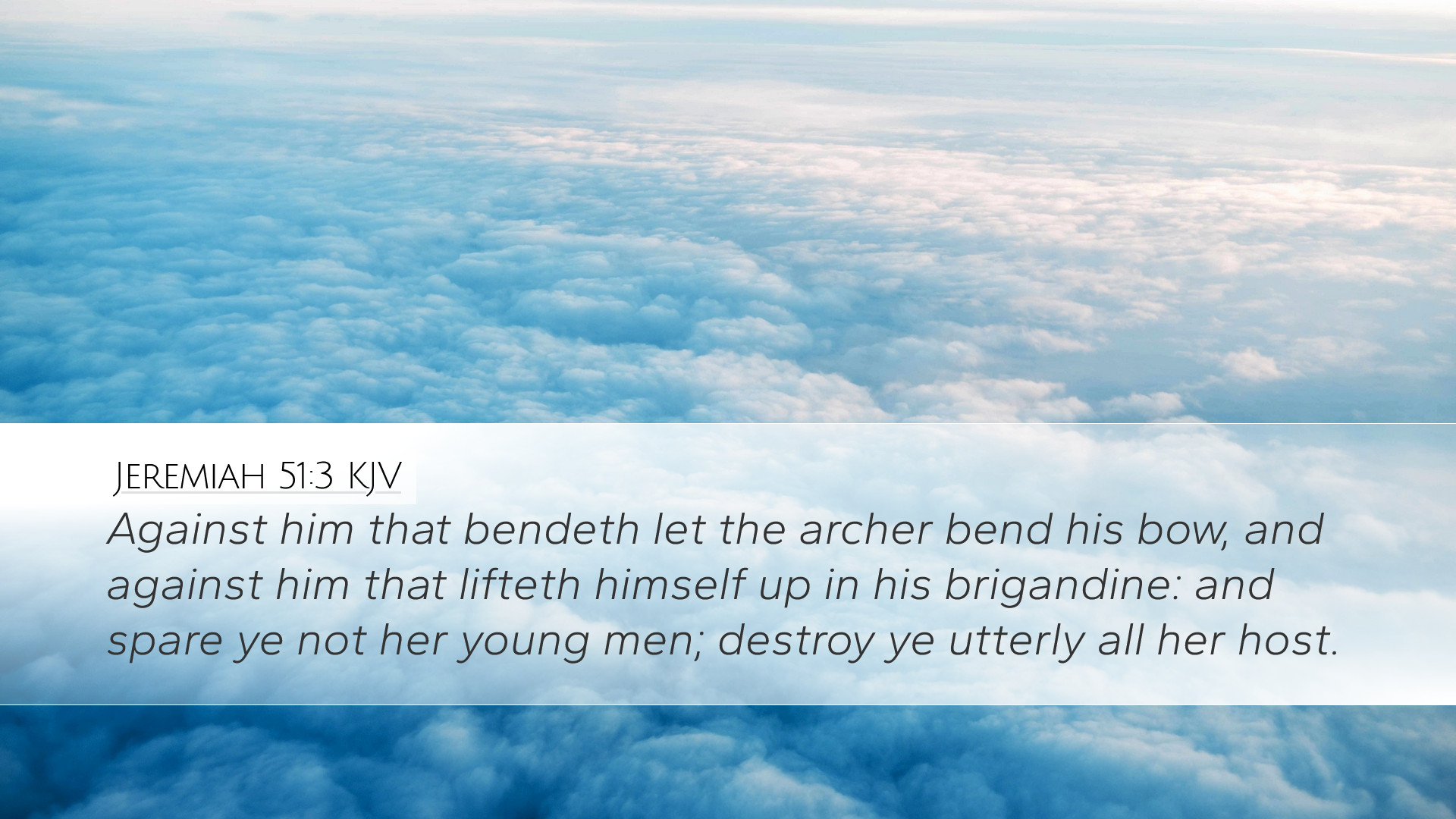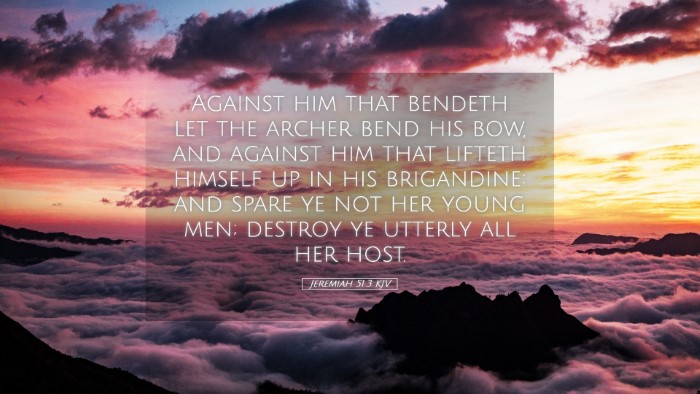Commentary on Jeremiah 51:3
Text of Jeremiah 51:3 (KJV): "Against him that bendeth let the archer bend his bow, and against him that lifteth up himself in his brigandine: and spare ye not her young men; destroy ye utterly all her host."
Introduction
This verse in Jeremiah 51 marks a pivotal and prophetic declaration concerning the impending judgment against Babylon, a prominent figure in biblical narratives symbolizing human pride and rebellion against God. Within the poetic and vivid imagery employed in this verse, we see not only a call to arms but also a theological underpinning of God's sovereignty over the nations and His ultimate plan for justice.
Exegesis and Context
The context of this chapter lies in God's judgment against Babylon for its sins and the future restoration of Israel. Jeremiah, as the prophet, delivers a message laden with imagery that portrays the totality of destruction that is to come upon Babylon. The chapter serves as both a warning and a promise—a warning to those who defy God, and a promise of vindication for His people.
Herodotus, the Greek historian, attests to the eventual downfall of Babylon, fulfilling the prophetic utterances found in this text. The imagery denotes comprehensive warfare against Babylon, illustrating not just physical confrontation, but a divine orchestrated ruin.
Insights from Commentaries
- Matthew Henry:
Henry emphasizes the differing layers of meaning within this verse, noting the metaphorical implications of the archer and the bow. He posits that the call to "bend the bow" symbolizes a united and concerted effort against the prideful city of Babylon. The imagery serves as a reflection of God's judgment, indicating that no one is beyond His reach, and even the powerful will fall under divine wrath. Furthermore, he notes the steadfastness required of those executing God’s judgment, as they are encouraged to spare none, indicating the totality of Babylon's impending fall.
- Albert Barnes:
Barnes provides a detailed look at the nature of the conflict described here. He notes that the "archer" represents those who pursue justice on God’s behalf, inviting not just the physical interpretation of arrows and armor, but a spiritual dimension underscoring the inevitability of God's plans. He elucidates that "the brigandine" serves as armor, a symbol of one’s protection, which ultimately fails in the face of divine purpose. He concludes with a somber reminder that while this passage describes destruction, it also points to God's righteousness in His dealings with nations who oppose His will.
- Adam Clarke:
Clarke's commentary delves into the figurative language of military engagement described in this verse. He elaborates on the necessity of engaging every aspect of Babylon’s might, remarking on the phrase "spare ye not her young men." Clarke interprets this as a call for complete obliteration of Babylon’s strength, indicating that even its youthful vigor and potential must be eradicated. This serves as a serious lesson regarding the consequences of national sin and collective rebellion against God.
Theological Implications
At its core, Jeremiah 51:3 resonates with themes of divine judgment, human pride, and national accountability. This verse serves as a stark reminder of God’s unwavering authority over nations and His ultimate goal of righteousness. The act of raising a bow against a fortified city underlines the futility of human strength in contrast to divine will.
Moreover, the complete destruction of Babylon also prefigures the finality of God’s judgment that will befall all nations that oppose Him. This should be a source of reflection for contemporary readers, urging introspection regarding national ethics and the collective relationship with God.
Practical Applications
-
Call for Vigilance:
The imagery of armed conflict reminds us that spiritual warfare is ongoing. Believers are urged to remain vigilant against the forces of evil that seek to undermine God's purposes.
-
Understanding God’s Justice:
This passage invites believers to reflect on the nature of God’s justice, encouraging a holistic understanding of His character that encompasses holiness, love, and righteous judgment.
-
National Responsibility:
The call to account not just for individuals, but for nations, poses a poignant reminder of the corporate responsibility to uphold and promote righteousness within society.
Conclusion
Jeremiah 51:3 encapsulates the profound themes of judgment and justice central to the biblical narrative. As believers engage with this text, they are reminded of the seriousness of rebellion against God and the certainty of His plans against pride and sin. The insights drawn from public domain commentaries enhance the understanding of this verse, urging the depth of reflection necessary for contemporary application.


